The Ministry of Health (MOH) in collaboration with the Rwanda Society of Obstetricians and Gynaecologists and Rwanda Family Health Project are organising training for doctors of district hospitals about the management of labour, C-section surgical skills, and post delivery or post C-section care.

The Ministry of Health (MOH) in collaboration with the Rwanda Society of Obstetricians and Gynaecologists and Rwanda Family Health Project are organising training for doctors of district hospitals about the management of labour, C-section surgical skills, and post delivery or post C-section care.
According to Dr Ramses Ramazani, an Obstetrician and gynaecologist at Muhima Hospital, the training will help prevent Obstetrical fistula.
"Fistulas are the consequence of prolonged labour but these days we are seeing many fistulas occurring after caesarean delivery. It is difficult to determine if these fistulas occurring after C-section are due to prolonged labour or poor surgical skills,” Ramazani said.
He said that he had been involved in the elaboration of the curriculum which will be used at the training that starts at the end of this month.
According to Barbara Margolies who heads the International Organisation for Women and Development which has been helping to provide treatment services to women suffering from fistula in Rwanda, many of the fistulas that are seen by doctors that make trips from the United States to Rwanda are caused by complications of C-sections performed in district hospitals.
"I would have to say that most of our patients are from poorer socio-economic areas. Women from rural areas who live in traditional ways of olden days, probably birth at home instead of going to health centres or district hospitals. It is these women who run into trouble with difficult birthing and often wait too long before getting professional help,” she said, explaining that the women end up with obstetric fistulas.
"But please keep in mind that there are numerous reasons for those complications,” she said.
The International Organisation for Women and Development has been flying doctors from the United States to operate surgery for fistula patients from across Rwanda at Kibagabaga Hospital in Kigali. The doctors fly in three times a year in February, April, and September.
While the February clinic received about 230 women, Dr Christian Ntizimira who heads Kibagabaga Hospital said that the number of fistula patients has decreased in comparison to previous clinics.
"We received 60 new cases within a week and 40 of the patients underwent surgery,” he said as he commented about the clinic that has been running since mid-April.
The Director General for Clinical Services at the Ministry of Health said that a study by the ministry is ongoing to establish the real nature of fistulas cases in the country.
"We still have fistula mainly due to home deliveries. Some fistulas are due to C-section but they are not too many because they are the most preventable. Even if fistula occurs at the hospital or health centre, it is a process that starts before the health facilities. Fistulas due to errors are not too many as they seem to be reported,” he said.




